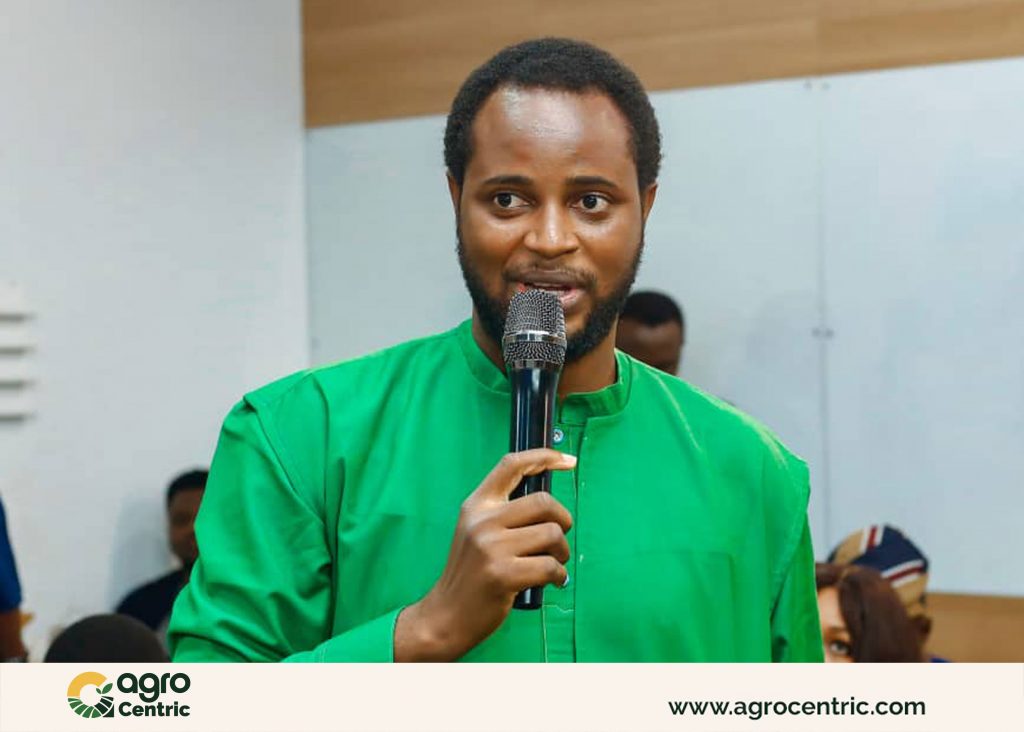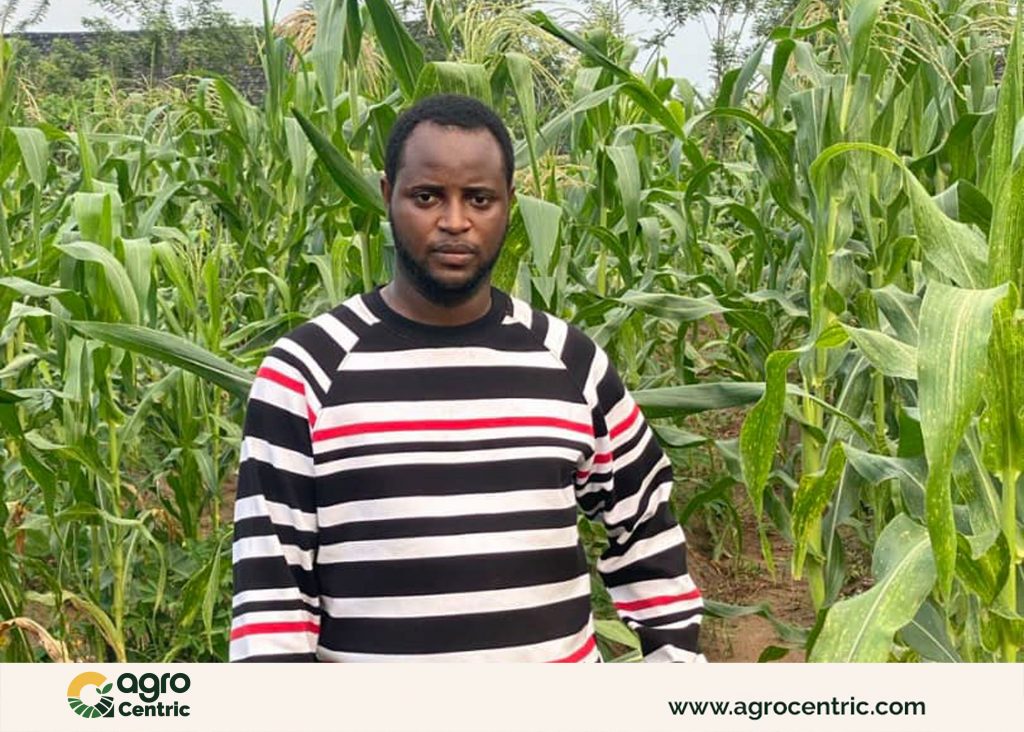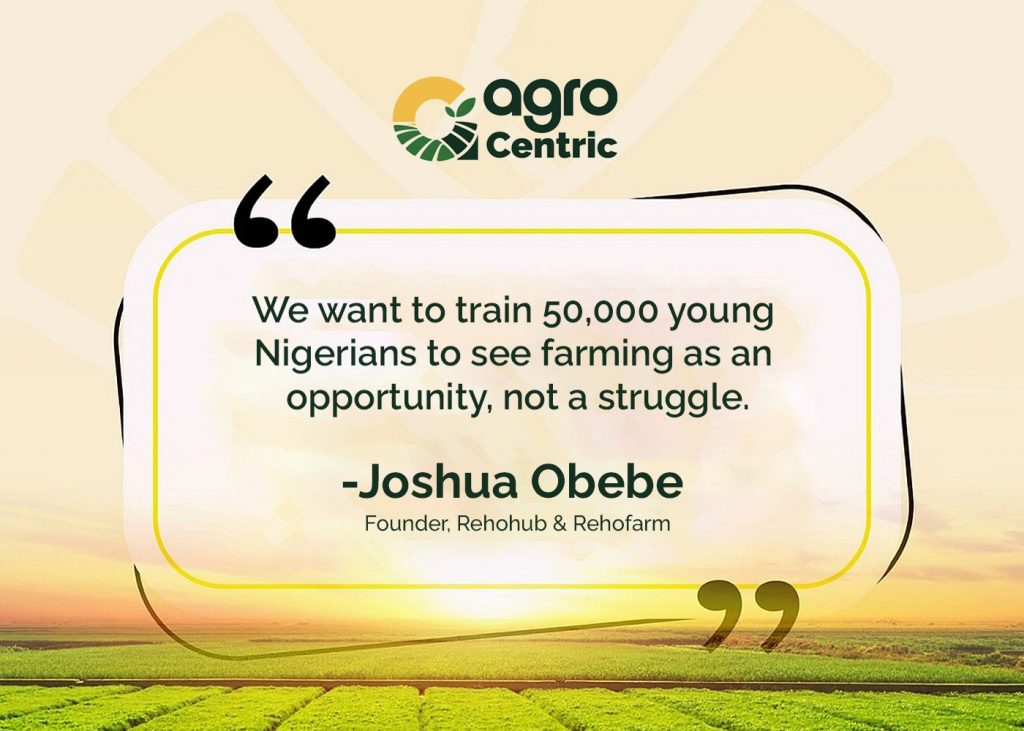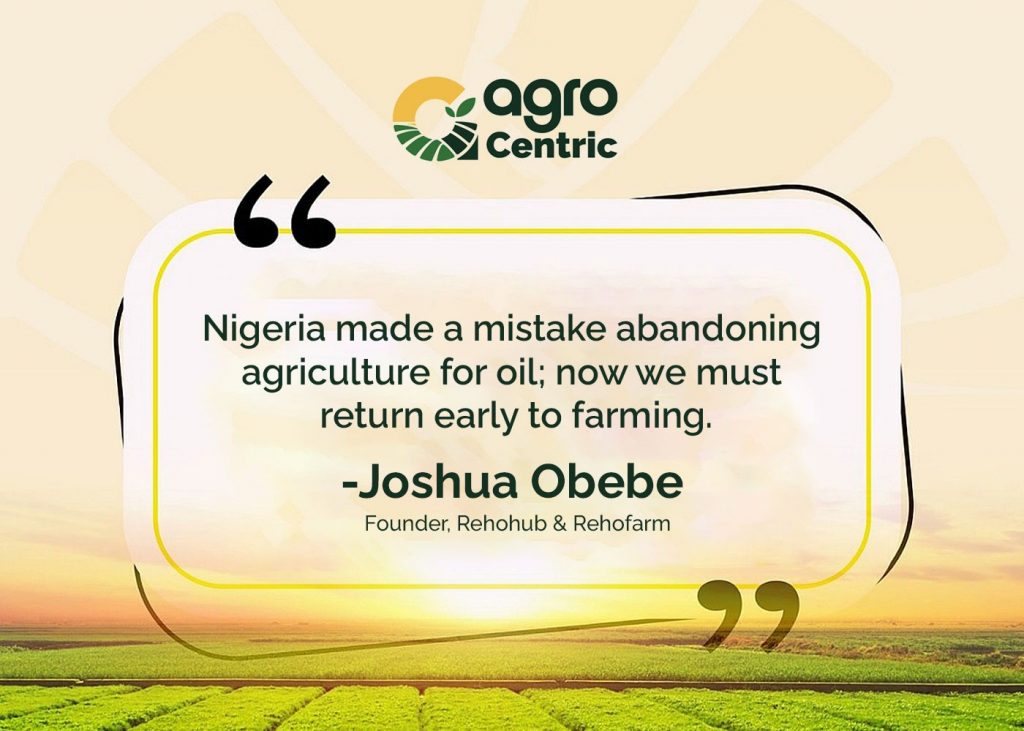
Post-harvest loss remains one of Nigeria’s biggest agricultural challenges. Over 40% of farm produce is wasted annually, a loss that costs billions and deepens food insecurity. For Joshua Obebe, founder of Rehofarm in Gbongan, Osun State, that statistic was too big to ignore.
With a degree in Language from Obafemi Awolowo University and an MBA from Lead City University, Joshua left city life in 2019 to return to the soil. There, he launched Rehohub and its agricultural arm, Rehofarm, to tackle waste through smarter, data-led farming and natural preservation.
In this conversation with AgroCentric, Joshua discusses how he’s using data to guide farmers, extending the shelf life of local staples without the need for preservatives, and how his goal to train 50,000 young Nigerians could shape the country’s food future.
Joshua, tell us about yourself and how you got into agriculture.
My name is Joshua Obebe. I studied Language at Obafemi Awolowo University and hold a master’s degree in Business Administration from Lead City University. I run Rehohub, which has several subsidiaries, one of which is Rehofarm, our agricultural arm.
My interest in farming started early. Growing up, we had a small backyard farm, with cassava, vegetables, and pepper, nothing on a large scale, just family farming without technical know-how. Later in life, I saw serious gaps in agriculture, especially in data and technical skill, and I realised that’s where I could make an impact.
After graduating in 2019, I moved to Gbongan, Osun State, because the land was affordable. At the time, you could buy an acre for around ₦260,000. I also believed Nigeria had made a mistake by shifting entirely to oil and abandoning agriculture. With global changes around fossil fuels, I knew it was time to return to farming.
How did Rehofarm start, and what’s the idea behind it?
Rehofarm is a subsidiary of Rehohub, a conglomerate that operates across multiple, interconnected fields; each subsidiary contributes to the same overarching vision. The goal is to build a complete ecosystem, including planting, processing, and distribution.
We officially started planning in 2019, researching and learning the ropes. By 2022, we began experimenting with seedlings, and in 2023, we went into full farming operations. Our focus areas are Crop farming, including cassava, cocoa, palm oil, and rubber; seedlings, particularly cocoa, where we cultivate viable local species; and food processing, which involves extending the shelf life of staple foods like pap and custard without the use of preservatives. We’ve developed a process that naturally extends shelf life to about 14 months.
Beyond these, we gather and test data, train farmers, and seek to build a full value-chain ecosystem: planting, production, processing, and bringing products to the final consumer.

You mentioned training and data. What makes Rehofarm different from extension officers?
The difference is in our approach. While Extension officers may wait for farmers to contact them, we go directly to them. We also focus on younger, data-driven farmers who can act on information quickly.
In agriculture, having data isn’t enough; you need it at the right time. We collect and share rainfall and soil data that help farmers decide when to plant. For example, rainfall patterns shifted in the last few years, and many farmers missed their planting seasons. Our goal is to help them adjust and improve yields.
How do you identify farmers who need your services, and do you move outside Gbongan?
Right now, we operate within our sphere of influence in Gbongan. We contact association heads, visit on meeting days, and share our data. In the interim, our capacity limits our trips to Gbongan, but we intend to extend our reach over time.
What’s the size of your operation now, and how many people are involved?
We work on nearly 10 hectares of land, with 10 acres used for seedling and product testing. Our internal team consists of 10 people, and to date, we’ve directly trained about 250 farmers.
You mentioned food processing. How far have you gone in that area?
We’re currently in the product testing phase, developing our standards of operation for pap and custard processing. We’ve extended the shelf life from 7 to 21 days, and now it can last up to 14 months without using chemicals or preservatives.
It might sound small, but extending the shelf life from a week to over a year is a significant leap for local processors. It helps reduce waste, ensures food safety, and enables farmers to sell their products more consistently.
How integrated is technology in your operations?
We’re not yet at the robotics or IoT stage, but we use mechanised farming, data analysis, and irrigation systems. We’re also introducing hydroponics, a method of growing plants without soil by supplying nutrients through water.
These methods may be standard globally, but they remain innovative in Nigeria. They allow us to farm year-round and reduce dependence on unpredictable weather.

What challenges have you encountered as a startup in the agribusiness sector?
Getting skilled labour is a big challenge; few people are willing to work on farms. Mechanisation helps, but it’s expensive for startups.
In 2024, we faced two major setbacks. One season, our farm was overrun by cattle, destroying part of our crops. Another time, we bought seeds from a new supplier, and most of them were non-viable. We lost an entire planting cycle and had to start over. Those experiences taught us to control our supply chain and test inputs in-house, where possible.
What lessons have you learned along the way?
Patience and perspective. I believe in what I call the power of “not yet.” I don’t see failure; it’s only the things we haven’t achieved yet. Agriculture demands that mindset. We may not be where we want to be, but we’ll get there if we keep going.
Despite the challenges, what successes are you most proud of?
Several. The biggest is our progress with shelf-life enhancement, transforming pap that used to last only a week into a product that now lasts over a year. That’s a game changer for local processors.
We’ve also started making returns from our palm and cocoa investments. Our farmer training programs are working. One group followed our advice to plant two weeks earlier based on rainfall data, and they got better yields. Those results keep us motivated.

Any concrete impact from training farmers, a story or two?
Yes. In Gbongan, we advised farmers to plant two weeks earlier than they normally would based on our rainfall data. They were sceptical initially; some said, “We won’t have rain by this time,” but they planted, and it worked. We’ve also shared pest-control updates sourced externally that helped protect crops. Those success stories confirm our approach.
What are your long-term goals for Rehofarm?
We dream of building a full-scale processing plant and already have the land for it. The goal is to mass-produce our processed foods at affordable prices, allowing Nigerians to enjoy preservative-free staples.
We’re also discussing a partnership with the Osun State Government to train 50,000 young people in agriculture. The proposed model would have the government provide machinery and buy produce directly from farmers, rather than just giving grants. That’s how to make agriculture sustainable.
How do you hope your story influences other young Nigerians?
I believe success breeds success. Once people see that agriculture works, they’ll join in. Before oil, agriculture was Nigeria’s backbone. It’s part of our culture and identity and can be our future again. My goal is to show that farming isn’t backward; it’s a modern, profitable, and essential part of rebuilding this country.

What should the government prioritise to support agriculture?
The first is logistics and mobility. Many farmers lose their produce due to poor roads and inadequate transportation. If the government fixes that, we’ll solve half the problem.
We don’t lack initiatives; we lack implementation. Good programs exist on paper, but they rarely reach the farmers. Agriculture affects everything: food, jobs, health, and stability, so it deserves more practical attention.
Who would you like to partner with?
We’d like to strengthen our relationships with the Ministry of Agriculture, extension offices, and state-level initiatives. Partnerships with organisations like IITA and government bodies would help us scale our work faster. We’re also pursuing collaborations that connect training, data, and mechanisation so farmers can produce efficiently at scale.
Anything else you’d like to add about your journey?
Agriculture isn’t our past; it’s our future. We’re building something that will last. It might take time, but we’ll get there.
Thank you, Joshua. Learn more about Joshua Obebe and Rehofarms on LinkedIn to follow their journey toward building a smarter, more sustainable food system.